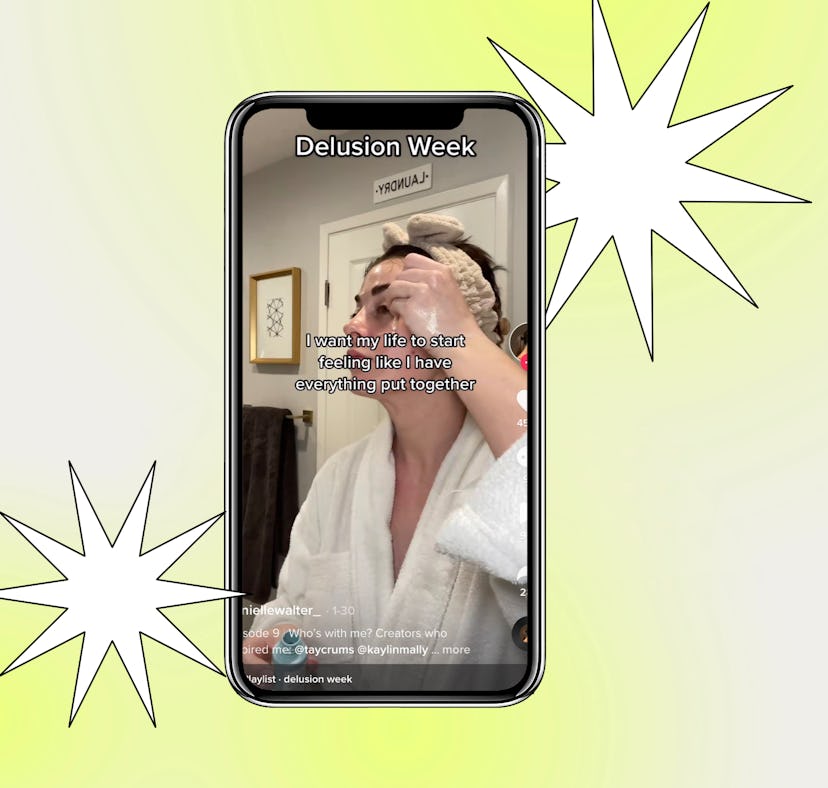
What Is The Delusion Week Trend On TikTok? A Psychologist Weighs In
What would the hottest version of yourself do?
Waking up early, doing a full skin care routine, making your bed, and hitting the gym before work are all things that sound like a good idea in the moment, but in reality, are hard to keep up with on a daily basis. That’s where scheduling a delusion week is coming into play. For one week only, TikTok users are challenging themselves to do things that the most successful version of themselves would do each day. Instead of doing whatever they feel like in the moment, they must follow a self-care routine and schedule that makes them more productive.
You’ve probably attempted a version of a delusion week before. Trying to wake up before work and make yourself breakfast instead of just hitting the snooze button until the last second is something that many people have tried and failed to do. It’s hard when your bed is the comfiest right as your alarm goes off, but during delusion week, you can’t just roll over. Instead, you’ve got to get up and follow your delusion week schedule. This TikTok trend was coined by Danielle Walter (@daniellewalter_), who decided to do a delusion week because she wanted to feel like her life had “everything put together more often than not.” Instead of doing what she wanted, she did “things that the hottest, most successful version” of herself would do.
Some examples of things Walter did included going to bed early, planning out her meals and outfits the night before, and reading and journaling instead of going on social media or watching Netflix. Walter also shared that she was inspired to #BeDelusional from TikToker Kaylin Mally (@kaylinmally), who also only did what the hottest version of herself would do for a week.
How To Do The Delusion Week Trend On TikTok
Inspired by Walter, TikToker Erin Horne (@erin_horne) decided to try a delusion week with her friends. They each came up with a set of rules to follow throughout that week. Your rules can be very different depending on your self-care and wellness needs. For instance, most delusion weeks include waking up and going to bed early, but your times can vary depending on when you have to go into work and what you want to do before.
Horne’s rules included going to the gym, no TikTok scrolling, and having a nutritional breakfast, all before 8 a.m. She also added tasks like drinking a gallon of water a day and having all meals be at home. The latter can definitely help you save some money if you’re the kind of person who orders delivery or goes out to eat a lot. To make sure you follow through on the experiment, you can also record a TikTok vlog each day as you check off different items on your delusion week schedule. While the concept of scheduling out self-care habits and following through on them sounds great, is the delusion week trend on TikTok actually beneficial long term?
A Psychologist’s Take On TikTok’s Delusion Week Trend
At the end of her week, Walter shared her delusion week observations. She noticed that using a Google calendar really helped her stay on schedule and she felt more “at peace at home” knowing her chores were all done. You may notice different things during your self-care week, but will those habits impact you in the long run? Elite Daily spoke to licensed clinical psychologist and founder of STEM Psychological Services, Amanda Cassil, Ph.D., who shared what’s great about this TikTok trend as well as what can be harmful.
Cassil says she has an issue with the term “delusional,” telling Elite Daily, “Delusions are difficult and debilitating experiences for real people, and using the term in this way is inaccurate and can be hurtful to and dismissive of people dealing with this challenge.” Instead, she offers up better terms like “Idealized Week” or “Project Manage My Life.” While the name can be harmful, Cassil says that this trend is actually based on “principles found in Behavioral Activation therapy.” This type of therapy “can be effective for treating depression and helpful for people who struggle with internal motivation,” by proposing “that if you do healthy behaviors, regardless of whether you feel motivated to do them, eventually your mood and thoughts will improve.”
She notes that you’re basically “running scientific experiments on your life” to better it. However, the key to making the trend your own is “looking for what works for you rather than simply imitating what celebrities or friends are doing.” Both Walter and Horne mention this in their TikToks, and agree that each week will be different depending on what you want to focus on. While you may want to emulate someone like Kim Kardashian or Selena Gomez, you have to remember that everyone is totally unique, and your needs and resources are different from anyone else’s.
Cassil recommends, “Before you start, it helps to know what your goals and values are, as you will have to let go of some things, face reality head on (the opposite of being delusional), and adjust to some discomfort.” She warns that you really should “listen to your limits” and avoid putting too much pressure on being productive all day, saying, “That’s usually a recipe for chronic stress and chronic illness.” Instead of a full schedule, she suggests starting out by changing just one to two habits. After about a week, see if you need to adjust anything. Once you find something that works for about a month, you can then focus on another habit you’d like to switch up. “This can help prevent burnout to build sustainable habits,” she says.
Expert Sources Cited:
Amanda Cassil, Ph.D., clinical psychologist, founder of STEM Psychological Services, and author of The Empowered Highly Sensitive Person